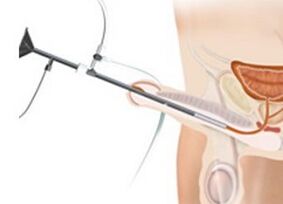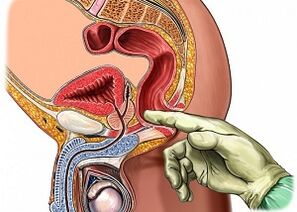Prostatitis is characterized by a complex inflammatory process in the prostate. The risk group consists of men aged 40 and over who lead a sedentary lifestyle. The first signs in the acute form appear with purulent discharge in the urine, severe pain syndrome and a rise in body temperature to 40 degrees. Chronic prostatitis is no less dangerous than acute, but it has a more hidden picture of development. Its danger lies in irreversible disorders associated with sexual function.
Prostatitis flow characteristics
Signs of prostatitis begin to bother men as a result of an inactive lifestyle, hypothermia, as a result of malnutrition.
The course of the disease can be characterized by one of two forms:
- Acute prostatitis- determined by purulent discharge in the urine. Specific causes are associated with pathogenic microflora. Antibiotic treatment is ineffective.
- Chronic- develops as a result of improper or ineffective treatment. The signs are not as pronounced as in the acute course.
During the period of remission, the symptoms of the pathology often disappear completely. Exacerbation of chronic prostatitis does not bother the patient as clearly as in the primary acute form. In most cases, the stagnant course of the disease is diagnosed as a consequence of inactive life in the background of chronic diseases, due to poor blood circulation in the pelvic organs.
Doctors divide the main signs of prostatitis into three groups:
- malfunctions of the urinary system, manifested by disorders of urine excretion;
- sexual disorders characteristic of enlarged prostate;
- development of nervous pathologies.
Inflammation of the prostate causes a decrease in the production of a special secretion that maintains the activity of sperm. As a rule, their resistance to harmful effects is reduced, and the chances of successfully fertilizing a female egg are close to the minimum.
According to medical statistics, the disease affects not only the elderly, but also quite young men. The risk group consists of the stronger sex than the age of 40. Doctors emphasize that the main emphasis should be placed on preventing the development of pathologies in the small pelvis and on preventive measures.
Symptomatic image
The symptoms of prostatitis are primarily represented by the pain syndrome. Unpleasant sensations in acute inflammation can be a sting, an incision, or pain. They cause reduced performance, sleep disorders. Enlargement of the prostate in the first stages can be determined by pain in the pelvic area. In some patients it develops during urination and defecation. During erection and ejaculation, the feelings of pain increase.
As a result of mechanical action on the walls of the urinary tract, pain is almost always associated with movement.
Problems with urine flow upset almost every patient in any form. Appear:
- false urge to urinate;
- feeling of incomplete bladder emptying.
A person may need effort to urinate and flow is slow and intermittent. Acute inflammation causes frequent urges to urinate.
In addition to the listed symptoms of prostatitis in the acute development of the disease, the following are manifested:
- muscle and joint pain;
- increase in body temperature up to 40 degrees;
- febrile state, cold;
- feeling of swelling in the groin area;
- discharge from urethra;
- burning and cramps when urinating;
- streaks of blood and pus in the urine.
Complications of the chronic course of prostatitis can be male infertility, scarring and narrowing of the urethral tissue, complex kidney damage, sepsis. The testicles, epididymis and seminal ducts become inflamed. A running course leads to prostate suppuration, which requires urgent surgical intervention. Surgical treatment necessarily requires obstruction of the bladder, which is accompanied by acute retention of urine.
Provocation factors
The main causes of prostatitis can be summarized in the following list:
- Sexually transmitted infections. Trichomonas, mycoplasma, chlamydia, gonococcus, Escherichia coli, enterococci can cause lesions of the urethra and prostate tissue.
- Sedentary and sedentary lifestyle contributes to the development of congestive and inflammatory processes in the pelvic organs.
- Disorders of lymphatic circulation and blood circulation.
- Constant interruptions or artificial increase in sexual intercourse, prolonged abstinence cause prostate disorders.
- Regular mental stress, excessive physical exertion, stressful situations also affect men's health and cause the development of prostatitis.
- Hypothermia, frequent colds and, as a result, reduced immunity become the causes of inflammatory processes in the reproductive organs.
- Hormonal disorders.
Treatment
It will not be possible to get rid of pathological signs of acute or chronic prostatitis in a short period of time.
When choosing specific therapies, it is important to identify the type and form of the disease through diagnostic studies.
Medications

Antibiotics are indicated when diagnosing bacterial prostatitis. If the inflammatory process is not caused by infection, there is no point in such therapy. The choice of a particular antibiotic is made by the physician who is present after identifying the microorganism that causes bacterial damage to the prostate.
In most cases, the medicine should be taken for at least 7 days. Alpha-blockers and antispasmodics help relieve pain. Systemic intake of this group of drugs helps to relax the muscles of the bladder and the prostate itself. This improves the flow of urine and reduces the manifestation of the overall clinical picture.
Intravenous fluids and diuretics are indicated for men with particularly severe pathology. This improves urine flow. In addition, this way you can stop the process of intoxication of the body.
Nonbacterial prostatitis is treated with antipyretic, analgesic, anticholinergic drugs. In case of constipation, it is necessary to use laxatives and suppositories based on vaseline oil.
Supportive care
Important stages of adjuvant therapy in drug treatment are:
- bed rest;
- complete rest;
- drink plenty of fluids, at least 2 liters a day;
- sitz hot baths.
In case of acute urinary retention, a temporary suprapubic fistula is prescribed. An alternative approach is regular bladder catheterization. Doctors prescribe such treatments only when drug therapy is ineffective. Patients should not forget about the contraindications for hypothermia of the body during treatment, cycling and prolonged sitting on hard surfaces.

From the first days of diagnosis of the prostate, prostate massage is prescribed. This method helps to relieve the pressure of the enlarged gland on the urethra, thus improving urination and reducing hardening.
Compliance with a diet that excludes spicy and fatty foods, as well as alcoholic and carbonated beverages, allows you to normalize your overall health.
Surgery
In cases where drug therapy had no effect in the treatment of prostatitis, surgery is required. In exceptional cases, with stagnant flow, urine flow is blocked. Surgical treatment is also necessary here. A contraindication for surgery is the patient's reproductive age. In young men, surgery can lead to infertility.
Transurethral resection of the prostate is a surgical excision of all inflamed tissues. Prostatectomy is performed to completely remove the prostate, adjacent tissues, and seminal vesicles. The negative consequences of such an intervention are urinary incontinence and impotence. This type of medical care is necessary for the malignant nature of the pathology. It allows you to get rid of the problems with the inflammatory process in the prostate once and for all.
Prostatitis is considered a complex and insidious disease, with permanent remissions in a chronic form. It is not always possible to completely cure it, so removing the main symptoms is a task that every doctor who strives to perform. How long it will take until their complete disappearance cannot be determined exactly. In most situations, urologists give comforting prognoses.
Alternative Therapy
Not only medical methods are used in the treatment of ailments, but also folk remedies.
Dead bee
Alcoholic tincture is prepared from 2 teaspoons. podmore and 200 ml of alcohol or vodka. It is taken 3 times a day on an empty stomach, 40-60 drops, depending on the patient's weight. Course therapy - 25 days. The composition of the earthworm contains unique components that have a therapeutic effect on problems with the male reproductive system.
Soup with the addition of 2 tsp. honey, 1 tsp. undercoat for 1 cup of hot water cook on low heat for 10 minutes. Then the drug must insist for about 3-4 hours. Usage is shown in 2 tbsp. l. twice daily before meals. The optimal period of treatment with this drug is 1 month. Then you have to take a break of 7-10 days and, if there is no improvement, continue the therapy.
Pumpkin seeds
Pumpkin seeds should be ground in a coffee grinder before use. Take 2 tablespoons daily on an empty stomach. l. , washed with a glass of water diluted in it 2 tsp. natural honey.
You can add fresh parsley juice to honey in a few drops.
Chestnut
Raw materials are mixed in equal proportions (10 g each):
- dried licorice root;
- leaves of berries, chestnuts, knotweed and castor oil.
To enhance the effect, you can add 15 g of dandelion, comfrey and beans. Every day it is necessary to prepare a fresh decoction of 1 tbsp. l. mixed vegetable raw materials and 0, 5 liters of water. Cook for 10 minutes, then leave for another half hour. Drink 4 doses just before meals. The course is 30 days.
Prevention
The manifestation of symptoms in the clinical picture of prostatitis contributes to the formation of inferiority complexes. This causes stressful situations and depressed mood in men. Many patients are characterized by irritability, prone to conflict. Aggressive behavior interferes with normal communication.
In most cases, you should seek the help of an experienced psychologist. After all, disorders of the sexual sphere have a very negative effect not only on a man's mood, but also on his entire life. Therefore, psychological rehabilitation is no less important than drug therapy.
Doctors recommend avoiding hypothermia and excessive physical exertion. An effective means of preventing prostatitis is an active sex life with a regular partner. Prolonged abstinence, incomplete ejaculation are contraindicated. It is necessary to limit the use of alcoholic beverages from the age of 40 and stop smoking. The main emphasis should be on moderate exercise and vitamin therapy.






























